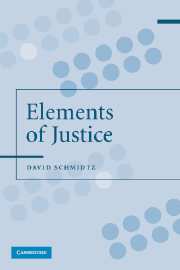Book contents
- Frontmatter
- Contents
- Acknowledgments
- PART 1 WHAT IS JUSTICE?
- PART 2 HOW TO DESERVE
- PART 3 HOW TO RECIPROCATE
- PART 4 EQUAL RESPECT AND EQUAL SHARES
- 18 Equality
- 19 Does Equal Treatment Imply Equal Shares?
- 20 What Is Equality for?
- 21 Equal Pay for Equal Work
- 22 Equality and Opportunity
- 23 On the Utility of Equal Shares
- 24 The Limits of Equality
- PART 5 MEDITATIONS ON NEED
- PART 6 THE RIGHT TO DISTRIBUTE
- References
- Index
19 - Does Equal Treatment Imply Equal Shares?
Published online by Cambridge University Press: 05 June 2012
- Frontmatter
- Contents
- Acknowledgments
- PART 1 WHAT IS JUSTICE?
- PART 2 HOW TO DESERVE
- PART 3 HOW TO RECIPROCATE
- PART 4 EQUAL RESPECT AND EQUAL SHARES
- 18 Equality
- 19 Does Equal Treatment Imply Equal Shares?
- 20 What Is Equality for?
- 21 Equal Pay for Equal Work
- 22 Equality and Opportunity
- 23 On the Utility of Equal Shares
- 24 The Limits of Equality
- PART 5 MEDITATIONS ON NEED
- PART 6 THE RIGHT TO DISTRIBUTE
- References
- Index
Summary
Thesis: There is a deep connection between equal treatment and justice, but not between equal treatment and equal shares.
ON BEHALF OF EQUAL SHARES
Bruce Ackerman's essay, “On Getting What We Don't Deserve,” is a dialogue that beautifully captures the essence of egalitarian concern about differences in wealth and income. Ackerman imagines you and he are in a garden. You see two apples on a tree and swallow them in one gulp while an amazed Ackerman looks on. Ackerman then asks you, as one human being to another: Shouldn't I have gotten one of those apples?
Should he? Why? Why only one? What grounds our admittedly compelling intuition that Ackerman should have gotten one – exactly one – of those apples? Notably, Ackerman denies that his claim is based on need, signaling that his concern is not humanitarian. Instead, Ackerman's point is that one apple would have been an equal share. To Ackerman, the rule of equal shares is a moral default. Morally, distribution by equal shares is what we automatically go to if we cannot justify anything else. In Ackerman's garden, at least, to say Ackerman does not presumptively command an equal share is to say he does not command respect.
Is Ackerman right? Looking at the question dispassionately, there are several things to say on behalf of “equal shares” even if we reject Ackerman's presumption in favor of it. In Ackerman's garden, equal shares requires no further debate about who gets the bigger share.
- Type
- Chapter
- Information
- The Elements of Justice , pp. 109 - 113Publisher: Cambridge University PressPrint publication year: 2006
- 2
- Cited by



